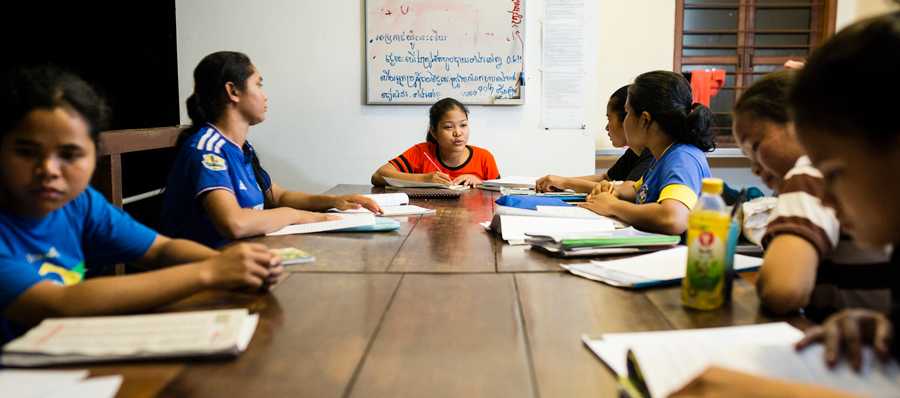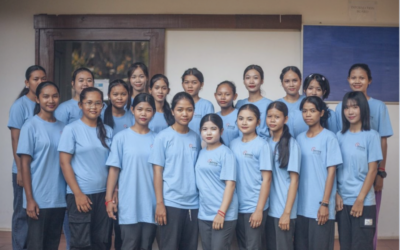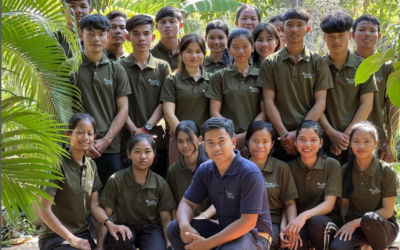
Vocational training at the Bayon School: a key to lifting young Cambodians out of poverty
In a country marked by a recent civil war that destroyed the education system, training young Cambodians for rapid access to the labor market has become a major issue in the fight against the cycle of poverty. Each year, the Bayon School offers quality vocational training to more than thirty young people from very disadvantaged backgrounds. Training a young person to access a decent job also helps him build a better future for himself and his whole family.
A low-skilled workforce, and unequal access to the labor market
%
Only young Cambodians completed secondary school in 2013, a percentage much lower than the developing country average (World Bank, 2017)
%
Women were able to complete their higher education in Cambodia in 2004. A high dropout rate linked to a family background and a culture leading women to marry young and take care of their families.
Source : UNESCO, Improving access, Equity and Relevance in Technical and Vocational Education en Training (TVET), Bangkok, 2004
%
Only employees have received appropriate training according to the Ministry of Socioeconomic Development (2015), a problem also raised by employers.
Structural issues for vocational training in Cambodia, which employers confirm:
- Low quality of training
- Limited infrastructure and resources preventing young people from rural areas in particular from being housed at their training site and from receiving an allowance to meet their needs
- Negative perception of this training system on the part of young Cambodians and their families
Source : UNESCO, 2004 et 2013, Policy review of TVET in Cambodia, 2013
Our vision: a pedagogy focused on practice and support
The Bayon School has opened two vocational training courses for young people from disadvantaged backgrounds living in the regions surrounding the Angkor temples:
- Professional training in baking and pastry-making launched in 2014 and reserved for young women
- Professional training in agroecological techniques (launch 2021)
Numerous actions make it possible to limit the barriers to access these two training courses for disadvantaged young people:
- Monthly allowances, housing and food costs fully covered, so that the financial aspect does not hamper access to quality training and limit the dropout rate.
- Reinforced English courses to promote rapid access to employment
- Soft skills courses, to consolidate interpersonal skills and self-confidence
- Permanent cultural exchanges with expatriates and customers of the Coffee Shop: a key element for the integration of young people in their future employment in the hotel or restaurant industry
- Personalized support throughout the training: a social team helps young people with their difficulties, their job search, preparation for interviews and CV writing
- Regular meetings with international professionals in the sector via our network of local and international partnerships such as Lesaffre Asie, which has supported us from the start.
- Real-life scenarios and professional experiences thanks to participation in local events and a 4-month practical internship.

An easier entry into the labor market to get out of poverty
Over the past 6 years, we have welcomed over a hundred young women to training in baking and pastry making.
In order to measure the impact of our actions, a study was carried out in 2020 among our last 80 graduate students and established certain findings:
%
Some of our former students are currently in post; the other students being unemployed for various reasons (going back to university or getting married, for example).
%
Some graduates are satisfied with their current jobs.
Are fully satisfied with the skills acquired during their training at the Bayon School, and almost all confirmed that these skills are very useful to them in their job.
%
Alumni are still working in the field of baking and pastry making (in well-known hotels, bakeries or coffee shops), the others having found other work that better meets their expectations.
Corresponds to the average salary of our former students, all promotions combined. Although the legal minimum wage in Cambodia is $ 170, a large part of the rural population does not reach this amount. Almost all of the graduates donate part of their salary to help support their families.
%
salary increase after 5 years of experience, confirming a positive correlation between seniority and career development, and 36% of our students earn more than $ 250 per month.
Our will: innovate to train
As a logical consequence of an action taken in favor of education, we are innovating to consolidate our mission in the field of vocational training.
In the field of baking and pastry making, the Ecole du Bayon has surrounded itself with the big names in the field (Thierry Marx for example) to offer cutting-edge training to female students. Year after year, we want to strengthen the excellence of the training we deliver, so we adapt our courses and strengthen our programs to allow us to be recognized as the best (partnership with ACE, development of a new bakery laboratory with quality material).
The school of agroecology, relies on solid partnerships with associations having experience and on a field of experimentation and numerous practical works which make it possible to create educational content adapted to young people of this age so that it is formed in a year.
blog
Follow our news
8 Months: A year in review for our apprentice pastry chef and agroecology experts
As the school year draws to a close, it's time to take a look of the past 8 months for our...
Say hello to our fantastic 10th graduating class !
At the beginning of February, we had the pleasure of welcoming the Class of 2024, a total of 20...
Discover our young talents from the class of 2024 !
We're delighted to introduce you to the young talents who joined our agroecology program last...


